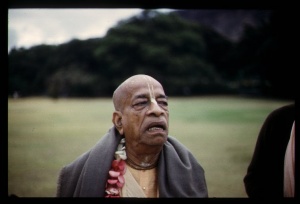CC Madhya 25.130: Difference between revisions
No edit summary |
(Vanibot #0054 edit - transform synonyms into clickable links, which search similar occurrences) |
||
| Line 19: | Line 19: | ||
<div class="synonyms"> | <div class="synonyms"> | ||
''gāyantaḥ'' | ''[//vanipedia.org/wiki/Special:VaniSearch?s=gāyantaḥ&tab=syno_o&ds=1 gāyantaḥ]'' — continuously singing; ''[//vanipedia.org/wiki/Special:VaniSearch?s=uccaiḥ&tab=syno_o&ds=1 uccaiḥ]'' — very loudly; ''[//vanipedia.org/wiki/Special:VaniSearch?s=amum&tab=syno_o&ds=1 amum]'' — that one (Lord Śrī Kṛṣṇa); ''[//vanipedia.org/wiki/Special:VaniSearch?s=eva&tab=syno_o&ds=1 eva]'' — certainly; ''[//vanipedia.org/wiki/Special:VaniSearch?s=saṁhatāḥ&tab=syno_o&ds=1 saṁhatāḥ]'' — being assembled together; ''[//vanipedia.org/wiki/Special:VaniSearch?s=vicikyuḥ&tab=syno_o&ds=1 vicikyuḥ]'' — searched; ''[//vanipedia.org/wiki/Special:VaniSearch?s=unmattaka&tab=syno_o&ds=1 unmattaka]-[//vanipedia.org/wiki/Special:VaniSearch?s=vat&tab=syno_o&ds=1 vat]'' — like those who have become mad; ''[//vanipedia.org/wiki/Special:VaniSearch?s=vanāt&tab=syno_o&ds=1 vanāt]'' — from one forest; ''[//vanipedia.org/wiki/Special:VaniSearch?s=vanam&tab=syno_o&ds=1 vanam]'' — to another forest; ''[//vanipedia.org/wiki/Special:VaniSearch?s=papracchuḥ&tab=syno_o&ds=1 papracchuḥ]'' — asked about; ''[//vanipedia.org/wiki/Special:VaniSearch?s=ākāśa&tab=syno_o&ds=1 ākāśa]-[//vanipedia.org/wiki/Special:VaniSearch?s=vat&tab=syno_o&ds=1 vat]'' — like the sky; ''[//vanipedia.org/wiki/Special:VaniSearch?s=antaram&tab=syno_o&ds=1 antaram]'' — within; ''[//vanipedia.org/wiki/Special:VaniSearch?s=bahiḥ&tab=syno_o&ds=1 bahiḥ]'' — outside; ''[//vanipedia.org/wiki/Special:VaniSearch?s=bhūteṣu&tab=syno_o&ds=1 bhūteṣu]'' — in all living entities; ''[//vanipedia.org/wiki/Special:VaniSearch?s=santam&tab=syno_o&ds=1 santam]'' — existing; ''[//vanipedia.org/wiki/Special:VaniSearch?s=puruṣam&tab=syno_o&ds=1 puruṣam]'' — the Supreme Person; ''[//vanipedia.org/wiki/Special:VaniSearch?s=vanaspatīn&tab=syno_o&ds=1 vanaspatīn]'' — all the trees and plants. | ||
</div> | </div> | ||
Latest revision as of 23:12, 19 February 2024

A.C. Bhaktivedanta Swami Prabhupada
TEXT 130
- gāyanta uccair amum eva saṁhatāḥ
- vicikyur unmattaka-vad vanād vanam
- papracchur ākāśa-vad antaraṁ bahir
- bhūteṣu santaṁ puruṣaṁ vanaspatīn
SYNONYMS
gāyantaḥ — continuously singing; uccaiḥ — very loudly; amum — that one (Lord Śrī Kṛṣṇa); eva — certainly; saṁhatāḥ — being assembled together; vicikyuḥ — searched; unmattaka-vat — like those who have become mad; vanāt — from one forest; vanam — to another forest; papracchuḥ — asked about; ākāśa-vat — like the sky; antaram — within; bahiḥ — outside; bhūteṣu — in all living entities; santam — existing; puruṣam — the Supreme Person; vanaspatīn — all the trees and plants.
TRANSLATION
"'All the gopīs assembled to chant the transcendental qualities of Kṛṣṇa very loudly, and they began to wander from one forest to another like madwomen. They began to inquire about the Lord, who is situated in all living entities, internally and externally. Indeed, they even asked all the plants and vegetables about Him, the Supreme Person.'"
PURPORT
This is a quotation from Śrīmad-Bhāgavatam (SB 10.30.4). The gopīs almost went mad due to Kṛṣṇa’s suddenly leaving the rāsa dance. Because the gopīs were fully absorbed in thoughts of Kṛṣṇa, they were imitating His different postures and pastimes. They became very much saddened because of His absence, and this incident is explained by Śukadeva Gosvāmī to Mahārāja Parīkṣit.